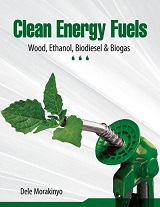
Environmental and Energy Business Resources
...everything environmental and energy...
Renewable and non-Renewable Energy
- An overview of renewable energy and non-renewable energy systems. For detailed description of each energy system, readers are encouraged to follow the relevant links on this page.
Energy is the ability of a system (human, mechanical etc) to do work. Practically all things on Earth require one form of energy or the other to function as designed or desired. Humans, animals, and mechanical/ electrical systems require energy inputs to perform. Electricity, heating, and lighting for home and industrial uses are all derived through energy.
Energy comes in different forms: kinetic, mechanical, electrical etc.
Energy can be transformed from one form to the other. However, overall energy within a system is conserved i.e. does not change - net energy lost balances net energy gained within the system.
There are various forms of energy sources. Most sources are traceable to the Sun. The traditional energy source, fossil fuels, received the initial energy from the light used by plants for photosynthesis and animal metabolic needs. Organic matters from the plant and animal remains later turn into the fossil fuels (Coal, oil and natural gas) which are currently widely in use for energy supply.
Some energy sources are renewable while others are non-renewable. Renewable energy sources are sources that are freely available and cannot be easily depleted while the non-renewable sources can run out and are often not freely available.
Some energy sources are non-polluting or have low pollution while others produce tremendous pollution as by-products of the transformation process that takes them to useful forms. Fossil fuels, for instance, has been noted for producing tremendous amount of green house gases (GHGs) which are heat trapping gases believed to be responsible for global warming with its attendant problems. For more details visit the Climate Change section.
To mitigate the effects of the climate change, there are increasing call and search for alternative energy sources. Alternative energy sources (alternative to fossil fuels) are sources producing little or no GHGs emissions while still meeting the current and future energy needs of the World. The renewable energy sources described earlier on this page are alternative energy sources (alternative to fossil fuels). However, alternative energy can also be realized from cleaner processing of the dirty fossil fuels or from other sources such nuclear energy.
Fossil fuels are fuels believed to have been formed from plants and animal remains of ancient times that have undergone significant decomposition. They are mainly Coal, Crude Oil (petroleum) and Natural Gas. Other less common and more expensive to process ones are bituminous sands (e.g. Canada's tar sands) and oil shale. Electricity that powers several industrial installations and provided lighting for cities and communities are derived from these three sources. The combustion of these fuels release GHGs, which contributes to climate change and global warning. Besides polluting the atmosphere, fossil fuels are non-renewable and are gradually being depleted.
Natural Gas produces lesser amount of GHGs than Coal and Oil and besides, the abstraction, transportation and storage processes for Natural Gas are being improved upon to further reduce the GHGs emissions to the atmosphere.
Some technologies such as Clean Coal Technologies (CCTs) have been suggested to make the burning of coal cleaner as well. CCTs are, however, still being researched.
Despite efforts to clean-up the production processes of energy from fossil fuels, several alternative energy sources (which are renewable and/or reduce or eliminate GHGs generation) are being researched constantly. Some of these alternative energy sources are: Solar Energy - energy from the Sun, Wind Energy - energy due to wind motion, Hydrogen Energy, Hydroelectric Energy, Geothermal Energy and others. Nuclear Energy, though not a renewable energy source, is considered an alternative energy source far more reliable than the fossil fuel energy sources, although with its own challenges.
For further details on these energy sources, follow the links contained in the left panel of this page and all the pages on energy sources on this website
Other Resources:
- Energy Resources - Contain information about various forms of energy
- Department of Energy - Energy Sources - United States Department of Energy
- The Energy Story - California Energy Commission
- EIA Energy Kids - Energy Kids: Energy Information Administration - United States Environmental Information Administration
- Sources of Renewable Energy - Website of the Pembina Institute
Ten sure ways to save on your home energy bill and help reduce global warming
All Information on our website are free for your use. You are required to reference our website each time you use our materials. Please link back to: Environmental and Energy Business Resources using website address: http://www.environbusiness.com.

